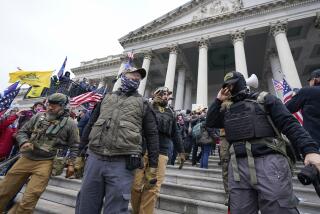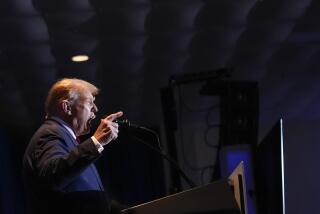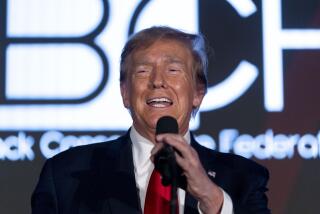President Obama often spoke about race relations in the U.S. Here are some of his words
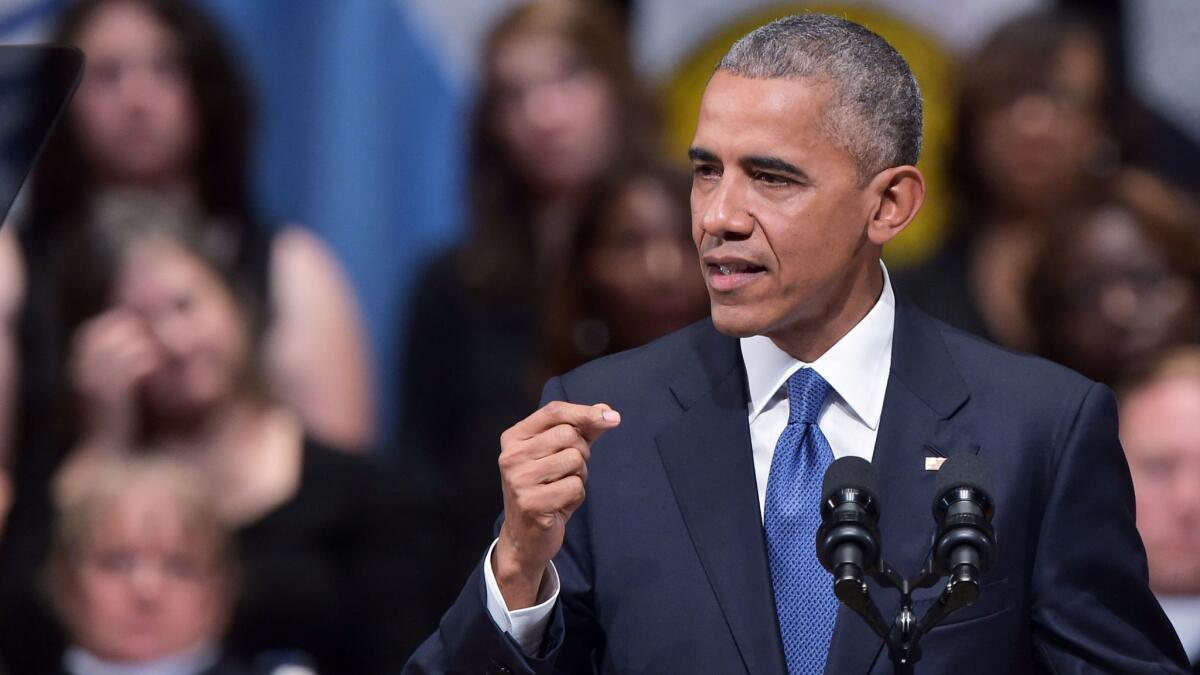
After the weekend violence in Charlottesville, Va., President Trump’s statements about white nationalists, neo-Nazis and their opponents drew criticism from some observers who said he failed to adequately address and acknowledge racial discord in the United States.
When Trump was asked Tuesday whether he believed race relations had improved or worsened since he took office in January, he said he thought they had “gotten better or [remained] the same.” He said race relations had been “frayed for a long time, and you can ask President Obama about that because he made speeches about that.”
Meanwhile, a quote Obama shared on social media after the Charlottesville violence, which included one death, had garnered 2.8 million “likes” by Tuesday evening, breaking the record of the most “liked” tweet in the history of the 11-year-old company, according to the social media platform. By Wednesday afternoon, the number of “likes” had surpassed 3.8 million.
The quote, by late former South African President Nelson Mandela, reads:
“No one is born hating another person because of the color of his skin, or his background, or his religion. People must learn to hate, and if they can learn to hate, they can be taught to love, for love comes more naturally to the human heart than its opposite.”
As the United States’ first black president, Obama often addressed the issue of race, and his reaction to racially charged incidents attracted intense scrutiny. Here are some of his comments:
July 24, 2009
Obama offended police in Cambridge, Mass., when he described them as acting “stupidly” when they arrested Harvard professor Henry Louis Gates Jr., who is black, on a charge of disorderly conduct at his home after a suspected break-in. Afterward, Obama convened a “beer summit” between the professor and the responding officer, Sgt. James Crowley, who is white. Gates accused the policeman of racial profiling, but Crowley’s superiors supported him and said he had acted appropriately. Obama acknowledged that his choice of words was poor.
“To the extent that my choice of words didn’t illuminate, but rather contributed to more media frenzy, I think that was unfortunate.... Because of our history, because of the difficulties of the past, you know, African Americans are sensitive to these issues. And even when you’ve got a police officer who has a fine track record on racial sensitivity, interactions between police officers and the African American community can sometimes be fraught with misunderstanding.”
July 19, 2013
After a Florida jury acquitted neighborhood watch captain George Zimmerman of killing Trayvon Martin, an unarmed black 17-year-old, Obama addressed the nation from the perspective of a black man and father and offered context for the resulting angry response to Zimmerman’s acquittal.
“You know, when Trayvon Martin was first shot, I said that this could have been my son. Another way of saying that is Trayvon Martin could have been me 35 years ago.... The African American community is looking at this issue through a set of experiences and a history that doesn’t go away.
“There are very few African American men in this country who haven’t had the experience of being followed when they were shopping in a department store. That includes me. There are very few African American men who haven’t had the experience of walking across the street and hearing the locks click on the doors of cars. That happens to me -- at least before I was a senator. . . .
“Those sets of experiences inform how the African American community interprets what happened one night in Florida.”
August 14, 2014
After the fatal shooting of 18-year-old Michael Brown, also unarmed and black, in Ferguson, Mo., Obama sought to draw on Americans’ commonalities. Darren Wilson, a white police officer, had gotten into an altercation with Brown and shot him after Brown reportedly had robbed a convenience store. The incident sparked protests and violence in Ferguson.
The president said:
“We’re all part of one American family. We are united in common values, and that includes belief in equality under the law, basic respect for public order and the right to peaceful public protest, a reverence for the dignity of every single man, woman and child among us, and the need for accountability when it comes to our government.
“So now is the time for healing. Now is the time for peace and calm on the streets of Ferguson. Now is the time for an open and transparent process to see that justice is done.”
After a St. Louis County grand jury did not indict Wilson in November 2014, Obama acknowledged the broader challenges the country still faced and called on the nation to seize the moment as an opportunity for change.
“We need to recognize that this is not just an issue for Ferguson, this is an issue for America. We have made enormous progress in race relations over the course of the past several decades. I’ve witnessed that in my own life. And to deny that progress I think is to deny America’s capacity for change.”
December 3, 2014
After a Staten Island, N.Y., grand jury declined to indict white New York police officer Daniel Pantaleo in the death of an unarmed black man, Eric Garner, while he was being arrested on suspicion of illegally selling loose cigarettes, Obama again addressed the nation’s racial discord.
“This is an American problem. When anybody in this country is not being treated equally under the law, that’s a problem. And it’s my job as president to help solve it.”
June 26, 2015
After the killings of nine black worshipers at the Emanuel African Methodist Episcopal Church in Charleston, S.C., by white supremacist Dylann Roof, Obama called on Americans not to “settle for symbolic gestures” and to follow up “with the hard work of more lasting change.”
“For too long, we’ve been blind to the way past injustices continue to shape the present. Perhaps we see that now. Perhaps this tragedy causes us to ask some tough questions about how we can permit so many of our children to languish in poverty, or attend dilapidated schools, or grow up without prospects for a job or for a career…..
None of us can or should expect a transformation in race relations overnight. Every time something like this happens, somebody says, ‘We have to have a conversation about race.’ We talk a lot about race. There’s no shortcut.”
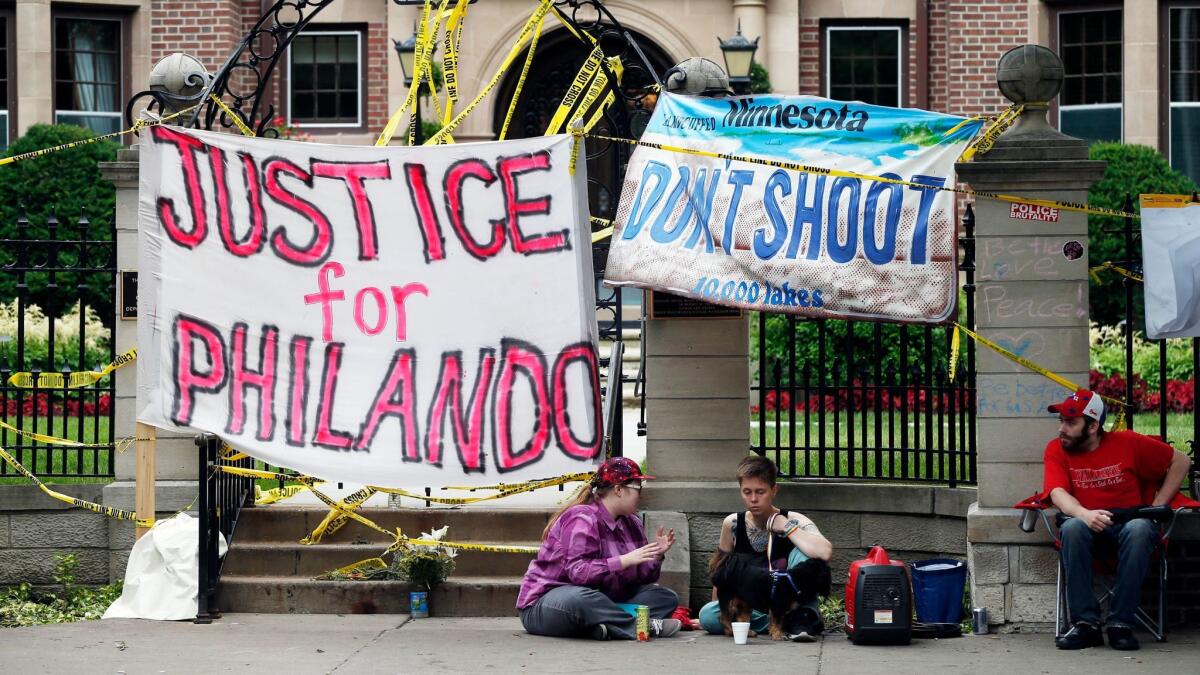
July 7, 2016
After the killings of Alton Sterling, a black man who was shot several times at close range while held down on the ground by two white Baton Rouge, La., police officers, and Philando Castile, a black man who was fatally shot by a Latino police officer in Minnesota after being pulled over in his car in a suburb of St. Paul, Minn., Obama again addressed the nation.
“What I can say is that all of us as Americans should be troubled by the news. These are not isolated incidents. They are symptomatic of a broader set of racial disparities that exist in our criminal justice system.…
African Americans are arrested at twice the rate of whites. African American defendants are 75% more likely to be charged with offenses carrying mandatory minimums. They receive sentences that are almost 10% longer than comparable whites arrested for the same crime.
So if you add it all up, the African American and Hispanic population, who make up only 30% of the general population, make up more than half of the incarcerated population. Now, these are facts.
And when incidents like this occur, there’s a big chunk of our fellow citizenry that feels as if because of the color of their skin, they are not being treated the same. And that hurts. And that should trouble all of us.”
July 12, 2016
After the deaths of five Dallas police officers who were ambushed by black assailant Micah Xavier Johnson during a Black Lives Matter rally, Obama called on police to acknowledge institutional racial bias but also condemned the officers’ slayings as an act of “racial hatred.” During a standoff, police killed Johnson using an explosive delivered on a remote-controlled device.
“I’m here to insist that we are not as divided as we seem. And I know that because I know America. I know how far we’ve come against impossible odds.”
Times staff writer Cathleen Decker contributed to this report.
For more on global development news, see our Global Development Watch page, and follow me @AMSimmons1 on Twitter
More to Read
Start your day right
Sign up for Essential California for news, features and recommendations from the L.A. Times and beyond in your inbox six days a week.
You may occasionally receive promotional content from the Los Angeles Times.
